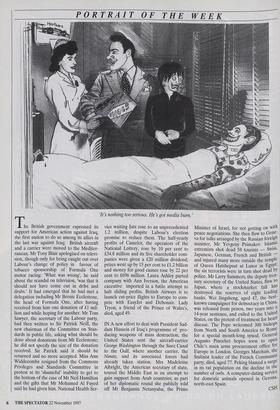PORTRAIT OF THE WEEK
'It's nothing too serious. He's got media burn.' The British government expressed its support for American action against Iraq, the first nation to do so among its allies in the last war against Iraq; British aircraft and a carrier were moved to the Mediter- ranean. Mr Tony Blair apologised on televi- sion, though only for being caught out over Labour's change of policy in favour of tobacco sponsorship of Formula One motor racing: 'What was wrong', he said about the scandal on television, 'was that it should not have come out in dribs and drabs.' It had emerged that he had met a delegation including Mr Bernie Ecclestone, the head of Formula One, after having received from him one donation of £1 mil- lion and while hoping for another. Mr Tom Sawyer, the secretary of the Labour party, had then written to Sir Patrick Neill, the new chairman of the Committee on Stan- dards in public life, asking what should be done about donations from Mr Ecclestone; he did not specify the size of the donation received. Sir Patrick said it should be returned and no more accepted. Miss Ann Widdecombe resigned from the Commons Privileges and Standards Committee in protest at its 'shameful' inability to get to the bottom of the case of Mr Neil Hamilton and the gifts that Mr Mohamed Al Fayed said he had given him. National Health Ser- vice waiting lists rose to an unprecedented 1.2 million, despite Labour's election promise to reduce them. The half-yearly profits of Camelot, the operators of the National Lottery, rose by 10 per cent to £34.8 million and its five shareholder com- panies were given a £20 million dividend; prizes went up by 15 per cent to £1.2 billion and money for good causes rose by 22 per cent to £696 million. Laura Ashley parted company with Ann Iverson, the American executive imported in a futile attempt to halt sliding profits. British Airways is to launch cut-price flights to Europe to com- pete with EasyJet and Debonair. Lady Tryon, a friend of the Prince of Wales's, died, aged 49.
IN A new effort to deal with President Sad- dam Hussein of Iraq's programme of pro- ducing weapons of mass destruction, the United States sent the aircraft-carrier George Washington through the Suez Canal to the Gulf, where another carrier, the Nimitz, and its associated forces had already taken station. Mrs Madeleine Albright, the American secretary of state, toured the Middle East in an attempt to gain support from Arab countries; as part of her diplomatic round she publicly told off Mr Benjamin Netanyahu, the Prime Minister of Israel, for not getting on with peace negotiations. She then flew to Gene- va for talks arranged by the Russian foreign minister, Mr Yevgeny Primakov. Islamic extremists shot dead 58 tourists — Swiss, Japanese, German, French and British -- and injured many more outside the temple of Queen Hatshepsut at Luxor in EgOt; the six terrorists were in turn shot dead by police. Mr Larry Summers, the deputy trea- sury secretary of the United States, flew to Japan, where a stockmarket fall has destroyed the reserves of eight leading banks. Wei Jingsheng, aged 47, the best- known campaigner for democracy in China, was released from prison, two years into a 14-year sentence, and exiled to the United States, on the pretext of treatment for head disease. The Pope welcomed 300 bishops from North and South America to Rome for a special month-long synod. General Augusto Pinochet hopes soon to open Chile's main arms procurement office for Europe in London. Georges Marchais, the Stalinist leader of the French Communist party, died, aged 77. Peking blamed a surge in its rat population on the decline in the number of owls. A computer-dating service for domestic animals opened in Gerona, north-east Spain. CSFI


















































































 Previous page
Previous page